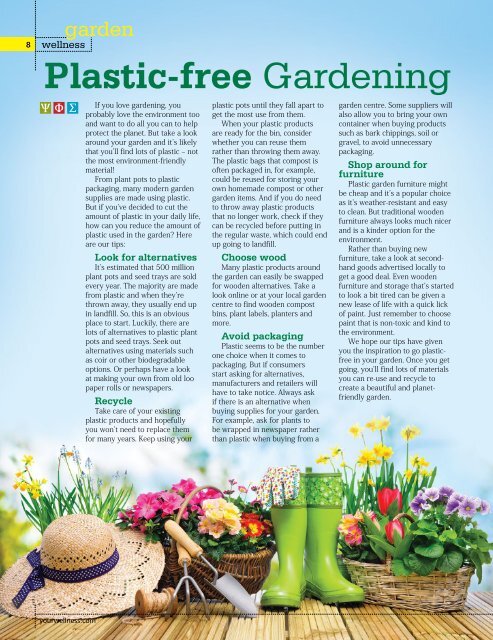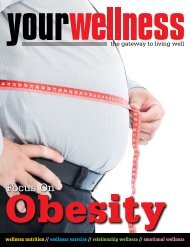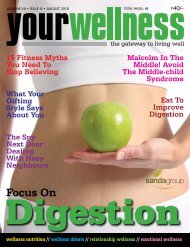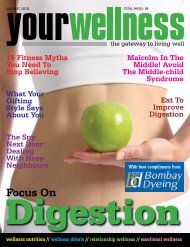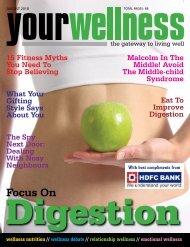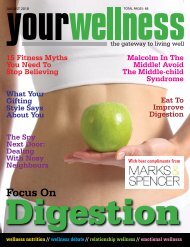Sand_Issue_September-2018
You also want an ePaper? Increase the reach of your titles
YUMPU automatically turns print PDFs into web optimized ePapers that Google loves.
garden<br />
8 wellness<br />
Plastic-free Gardening<br />
If you love gardening, you<br />
probably love the environment too<br />
and want to do all you can to help<br />
protect the planet. But take a look<br />
around your garden and it’s likely<br />
that you’ll find lots of plastic – not<br />
the most environment-friendly<br />
material!<br />
From plant pots to plastic<br />
packaging, many modern garden<br />
supplies are made using plastic.<br />
But if you’ve decided to cut the<br />
amount of plastic in your daily life,<br />
how can you reduce the amount of<br />
plastic used in the garden? Here<br />
are our tips:<br />
Look for alternatives<br />
It’s estimated that 500 million<br />
plant pots and seed trays are sold<br />
every year. The majority are made<br />
from plastic and when they’re<br />
thrown away, they usually end up<br />
in landfill. So, this is an obvious<br />
place to start. Luckily, there are<br />
lots of alternatives to plastic plant<br />
pots and seed trays. Seek out<br />
alternatives using materials such<br />
as coir or other biodegradable<br />
options. Or perhaps have a look<br />
at making your own from old loo<br />
paper rolls or newspapers.<br />
Recycle<br />
Take care of your existing<br />
plastic products and hopefully<br />
you won’t need to replace them<br />
for many years. Keep using your<br />
plastic pots until they fall apart to<br />
get the most use from them.<br />
When your plastic products<br />
are ready for the bin, consider<br />
whether you can reuse them<br />
rather than throwing them away.<br />
The plastic bags that compost is<br />
often packaged in, for example,<br />
could be reused for storing your<br />
own homemade compost or other<br />
garden items. And if you do need<br />
to throw away plastic products<br />
that no longer work, check if they<br />
can be recycled before putting in<br />
the regular waste, which could end<br />
up going to landfill.<br />
Choose wood<br />
Many plastic products around<br />
the garden can easily be swapped<br />
for wooden alternatives. Take a<br />
look online or at your local garden<br />
centre to find wooden compost<br />
bins, plant labels, planters and<br />
more.<br />
Avoid packaging<br />
Plastic seems to be the number<br />
one choice when it comes to<br />
packaging. But if consumers<br />
start asking for alternatives,<br />
manufacturers and retailers will<br />
have to take notice. Always ask<br />
if there is an alternative when<br />
buying supplies for your garden.<br />
For example, ask for plants to<br />
be wrapped in newspaper rather<br />
than plastic when buying from a<br />
garden centre. Some suppliers will<br />
also allow you to bring your own<br />
container when buying products<br />
such as bark chippings, soil or<br />
gravel, to avoid unnecessary<br />
packaging.<br />
Shop around for<br />
furniture<br />
Plastic garden furniture might<br />
be cheap and it’s a popular choice<br />
as it’s weather-resistant and easy<br />
to clean. But traditional wooden<br />
furniture always looks much nicer<br />
and is a kinder option for the<br />
environment.<br />
Rather than buying new<br />
furniture, take a look at secondhand<br />
goods advertised locally to<br />
get a good deal. Even wooden<br />
furniture and storage that’s started<br />
to look a bit tired can be given a<br />
new lease of life with a quick lick<br />
of paint. Just remember to choose<br />
paint that is non-toxic and kind to<br />
the environment.<br />
We hope our tips have given<br />
you the inspiration to go plasticfree<br />
in your garden. Once you get<br />
going, you’ll find lots of materials<br />
you can re-use and recycle to<br />
create a beautiful and planetfriendly<br />
garden.<br />
yourwellness.com


